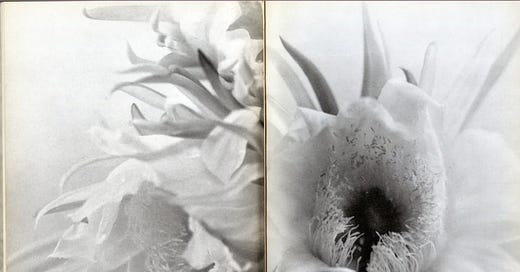This contains the sixth set of my translations-variations [translations with changes / additions / subtractions, etc.] of Emil Cioran’s untranslated notebooks [Cahiers], covering the period October 11 1962 — December 31 1962. Sets I, II, III, IV and V are linked at the end.
October 11 1962
We always return to our first doubts.
The impossibility of doing anything — why not use it as a path to holiness?
Not the devil but death that is the problem. The achievement of Christianity is to have made us believe the opposite.
As the Bhagavad-Gita says: better to die in your own way than to be saved according to someone else’s.
According to the Zohar, “as soon as man appeared, flowers appeared.”
The opposite — in creating man, God killed all flowers — would be closer to the truth.
Genesis could be rewritten accordingly:
First, God created the great whales.
Then he annihilated them.
Then, God created cattle.
Then he annihilated them.
Then, God created man.
Then he annihilated him.
Nietzsche died too soon: he was unable to accumulate sufficient self-disgust to bring his thought to a final serenity.
If he had reached sixty, he would have realised the Übermensch belong not to a theory of the future but to a theory of marital comedy —
When the Persian interpreter expressed to Themistocles Xerxes’ demand for land and water, “Themistocles put him to death for having dared to use the Greek language to express the orders of a barbarian” (Plutarch, Themistocles).
And yet when I speak French, the entire country cums in their pants?
October 22 1962
For melancholics, Saint Teresa could only think of one remedy: terror.
Life: a digression from matter.
I love only those who cannot differentiate between suffering and the idea of suffering.
October 26 1962
Proust is teeming with aphorisms, but they can only be detected through an intense resistance to the total meaning of his work — a resistance which, in practice, is impossible to sustain.
Saints, too, are chained — to eternity.
Valéry: proof that elegance is detrimental to thought.
‘Art for its own sake.’ Can anything less funny than comedy for the sake of comedy be imagined?
Self-confidence has two related results: action and error.
We do not adopt a belief because it is true (they all are), but because we need it, because some dark internal force pushes us into it. If this force fails us, “skepticism” intercedes, if only to protect us from grasping our infirmity.
In every denial, there is a secret pleasure — one which can’t be denied.
It’s impossible to read a line of Kleist without thinking that he killed himself. His suicide was one with his life; he had been committing suicide all along.
November 11 1962
Keep reading with a 7-day free trial
Subscribe to oldoldoldoldnew to keep reading this post and get 7 days of free access to the full post archives.



